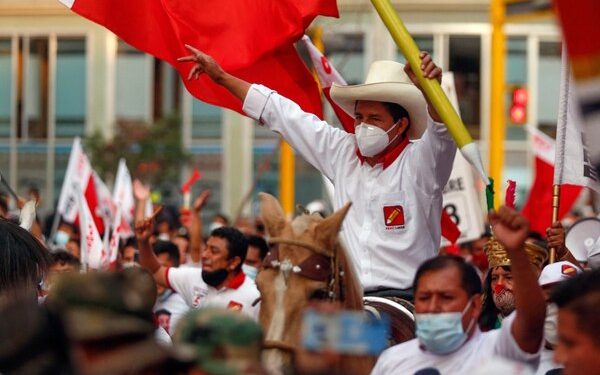By Miguel Lamas, leader of the Bolivian ARPT party and the IWU-FI
28 July 2021
Finally, over a month after the run-off election and after attempts by Keiko Fujimori and the right-wing to disregard the result, the electoral authority proclaimed Castillo’s victory for the presidency. Will it be a government in favour of the working people?
Castillo takes office during a deep economic and health crisis. Peru is one country in the world with the highest death toll because of the pandemic. Its capitalist economic model – subject to imperialism – of privatisation, corruption, predatory multinational mining and destruction of labour laws, has left three out of ten people in poverty and over 70% of workers in the informal market.
Castillo led the three-month national teachers’ strike in 2017 against the Kutzinski government for the teachers’ statute. People saw him as an alternative for change in favour of working people. Based on his union leadership, his peasant background, and the disappointment of millions in the bosses’ politicians.
Pedro Castillo had over 80% of the votes in the south, in the peasant sectors that fought the hardest against the mining multinationals that destroy their agriculture.
There was an electoral swing to the left of millions of workers fed up with the bosses’ corrupt governments that serve the multinationals and themselves.
Castillo proposes to govern with the big capitalists
But Castillo will not meet his voters’ expectations, he represents a reformist left that will reproduce a new government of class conciliation or centre-left. As has already happened with Chávez-Maduro in Venezuela, Lula-Dilma in Brazil, or Evo Morales in Bolivia.
Castillo’s first concrete announcement that he will receive his teacher’s salary as the president went down very well with the people.
However, it also shows that he is preparing to govern in agreement with the big capitalists. His economic adviser, and most likely Minister of Finance, is Pedro Francke, who is on excellent terms with big business. Francke says they will promote “the popular economy with markets”, which “is a model of free action by private enterprise, as we have had until now, but with a greater redistributive component by the state” (https://www.bnamericas.com/en/news/business-welcomes-perus-president-elect).
At the height of the economic crisis, he says that “the free action of private enterprise” (including the mining companies that are devastating Peruvian agriculture) is compatible with “redistribution”.
He also explains that his model is like that of Evo Morales in Bolivia: “The Bolivian economy has a good tax component, but in oil and hydrocarbon production the transnational companies continue. In the industrial and agricultural sector, there are also private companies and there is no price control.
Because of this model of governing with the capitalists in Bolivia during Evo Morales’ fourteen years in office, prices were very favourable for its gas and mineral exports, but there was no change in the economic structure. And as in Peru, over 70% are in the informal economy, while the transnationals and the oligarchs take the wealth and the country is also going through a deep economic crisis.
Let the capitalists pay for the crisis!
One of Castillo’s promises, and popular demand, is to change the constitution made by Fujimori’s dictatorship with a constituent assembly. One slogan shouted in the streets of Lima by thousands of young people was “For the constituent assembly, Castillo president”. But now, given his attempts to agree with the right-wing, which has a parliamentary majority, the constituent assembly may be forgotten.
The political crisis in Peru is still open, and the working people who gave Castillo the victory will probably mobilise for their urgent demands.
The United Workers Party (IWU-FI) and the Socialist Alternative of Ayacucho are holding their merger congress on 28 and 29 July. They were part of the campaign calling for a vote for Pedro Castillo against the candidacy of Keiko Fujimori. But in the campaign, and now, they have no confidence in the new government. They have an independent policy and call to rely only on mobilisation and TO FIGHT for jobs, health and education. Not for the IMF and the capitalists! Tax the enormous fortunes now!
“To defeat the model and the starvation system, let’s support the mobilisation and struggle for a workers’, popular and peasant solution so that the crisis is not paid for by the workers and the peoples, but by the capitalists!













